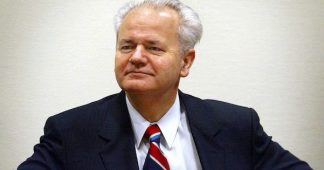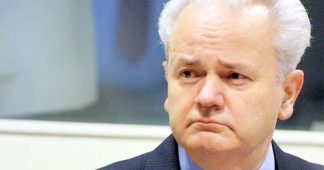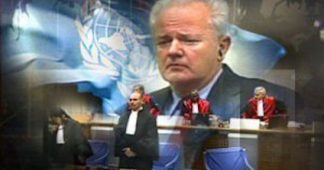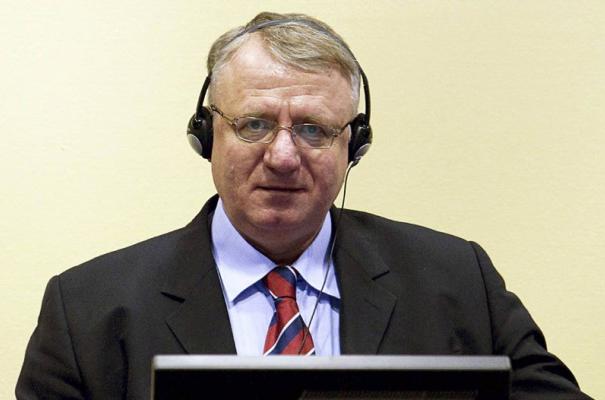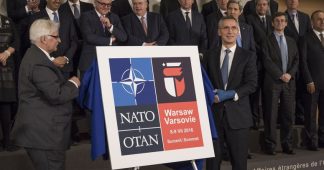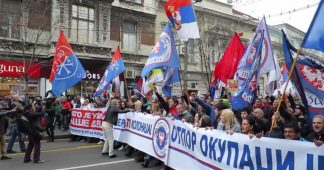By Christopher Black
A recent report by Andy Wilcoxson, who has been following the trials at the ICTY, states that the judgement in the Dr. Karadzic case, issued in March of this year, “exonerated” or cleared President Milosevic of the allegations made against him by the prosecution at the ICTY. However, the judgement contains other findings by these judges that muddy the waters and remind us that though they did accept certain favourable facts regarding Milosevic, their purpose was not to “clear” Milosevic but to convict Karadzic and so they used legitimate disagreements on strategy and tactics between Milosevic and Karadzic to diminish the role of Milosevic in this case and exaggerate the role of and belligerency of Karadzic.
The report by Wilcoxson quotes the following from the judgement;
the Chamber is not satisfied that there was sufficient evidence presented in this case to find that Slobodan Milosevic agreed with the common plan” to permanently remove Bosnian Muslims and Bosnian Croats from Bosnian Serb claimed territory.
And that,
the relationship between Milosevic and the Accused had deteriorated beginning in 1992; by 1994, they no longer agreed on a course of action to be taken. Furthermore, beginning as early as March 1992, there was apparent discord between the Accused and Milosevic in meetings with international representatives, during which Milosevic and other Serbian leaders openly criticised Bosnian Serb leaders of committing ‘crimes against humanity’ and ‘ethnic cleansing’ and the war for their own purposes.
And that,
from 1990 and into mid-1991, the political objective of the Accused and the Bosnian Serb leadership was to preserve Yugoslavia and to prevent the separation or independence of BiH, which would result in a separation of Bosnian Serbs from Serbia; the Chamber notes that Slobodan Milosevic endorsed this objective and spoke against the independence of BiH.
And,
The Chamber found that “the declaration of sovereignty by the SRBiH Assembly in the absence of the Bosnian Serb delegates on 15 October 1991, escalated the situation,but that Milosevic was not on board with the establishment of Republika Srpska in response. The judgment also says that “Slobodan Milosevic was attempting to take a more cautious approach.
And,
The judgment states that in intercepted communications with Radovan Karadzic,
“Milosevic questioned whether it was wise to use ‘an illegitimate act in response to another illegitimate act’ and questioned the legality of forming a Bosnian Serb Assembly.” The judges also found that “Slobodan Milosevic expressed his reservations about how a Bosnian Serb Assembly could exclude the Muslims who were ‘for Yugoslavia’.”
And that,
“Slobodan Milosevic stated that ‘[a]ll members of other nations and ethnicities must be protected’ and that ‘[t]he national interest of the Serbs is not discrimination’.” Also that “Milosevic further declared that crime needed to be fought decisively.”
And,
The trial chamber notes that “In private meetings, Milosevic was extremely angry at the Bosnian Serb leadership for rejecting the Vance-Owen Plan and he cursed the Accused.” They also found that “Milosevic tried to reason with the Bosnian Serbs saying that he understood their concerns, but that it was most important to end the war.”
and that,
Milosevic also questioned whether the world would accept that the Bosnian Serbs who represented only one third of the population of BiH would get more than 50% of the territory and he encouraged a political agreement.
And that at a meeting of the Supreme Defense Council the judgment says that “Milosevic told the Bosnian Serb leadership that they were not entitled to have more than half the territory in BiH, stating that: ‘there is no way that more than that could belong to us! Because, we represent one third of the population. […] We are not entitled to in excess of half of the territory – you must not snatch away something that belongs to someone else! […] How can you imagine two thirds of the population being crammed into 30% of the territory, while 50% is too little for you?! Is it humane, is it fair?!’”
In other meetings with Serb and Bosnian Serb officials, the judgment notes that Milosevic,
“declared that the war must end and that the Bosnian Serbs’ biggest mistake was to want a complete defeat of the Bosnian Muslims.” Because of the rift between Milosevic and the Bosnian-Serbs, the judges note that, “the FRY reduced its support for the RS and encouraged the Bosnian Serbs to accept peace proposals.”
This is indeed what is contained in a few paragraphs in the 2,590 page “judgement” against Karadzic and these statements do reflect some of what President Milosevic presented in his defence at his show trial and what was in news accounts of the period. They are important to bring to the attention of the public once again and we must thank Mr. Wilcoxson for making this available to the public.
But the judges also state, at Paragraph 2644 that though “In May 1991, Slobodan Milosević told the Accused that his position should be that they were against the secession and wanted BiH to remain in Yugoslavia, to which the Accused agreed, in another conversation in July 1991, Milosević told the Accused that their objective was to “have disintegration in […] line with our inclinations” and that they “should take radical steps and speed the things up”.
At paragraph 2645 they continue,
“In other conversations, Slobodan Milosević told the Accused that the Serbs would not be divided into many states, and that this “should be the basic premise for your thinking”
At paragraph 2689 they state, “Despite these words of caution, Slobodan Milosević, in meetings with international representatives, did not accept the independence of BiH and spoke of the desire of all Serbian people to live together.”
At paragraph, 2691, they state,
“In December 1991, Milosević told the Accused that he should not give in to Izetbegović and that they had to stick to their line and that If they want to fight, we’ll fight” given that the Serbs were stronger.”
So the ICTY Judges were very sure to make it clear that both Milosevic and Karadzic were on the same page generally in seeking a “Greater Serbia,” a thread running throughout the Prosecution case against Milosevic in his case. Milosevic denied it in his trial since it was nothing but NATO propaganda.
Both Karadzic and Milosevic wanted to preserve the Federal Republic of Yugoslavia as much as possible. That was their goal, not to create a Greater Serbia by ethnically cleansing non-Serb areas in the republics which had split off from the Federal Republic. But that is the mantra still chanted in the Karadzic case and the thesis of the prosecution case is that this alleged desire to create a Greater Serbia, was a “joint criminal enterprise” and, that from this ambition, all the crimes they allege against them were the consequence.
I will not go deeply into the concept of “joint criminal enterprise since it is a concept unknown to law anywhere in the world and is an invention by the prosecution of the ICTY and its American controlled staff, who crafted this idea from the RICOH anti-racketeering laws of the 1930’s in the USA used to target Al Capone. Essentially, being found a part of a “joint criminal enterprise” means that the proof of intent to commit a crime is not required, undermining the entire basis of western justice that there can be no crime without intent to commit one. Once one is found to be a member of such an “enterprise” lack of intent will not save you. It is the epitome of guilt by association. But it is important for the ICTY since without it the conviction of Karadzic would be impossible.
That there were differences of opinion between the two men and their governments on whether to form a Serb republic inside Bosnia, what form it should take and when it should be done and how it should be protected is hardly surprising. But it is clear that these judges did not consider their judgement to have cleared Milosevic of the central allegation made against him in his trial of wanting to create a Greater Serbia when seen in light of the other paragraphs in the judgement in which, as we see, they allege that Milosevic supported this ambition and supports fighting the government of Izetbegovic.
But what are we dealing with here? We are dealing with judges of the very tribunal that falsely imprisoned Milosevic, fabricated charges against him and his government, and ended up killing him. Milosevic does not need “exonerating” or “absolving” for no case was ever made out against him and he was never convicted of anything.
I have trouble accepting any finding of this illegal and fascist tribunal as “clearing” a man who was guilty only of defending his country against a NATO attack and who was then put through the humiliation of having to respond to the worst types of NATO propaganda dressed up as an indictment. That he did so with courage, tenacity and intelligence was plain for all to see who watched the trial progress. That is the reason that “trial of the century” suddenly went dark one day and public was cut off from seeing what was happening day by day during that long ordeal.
So, the facts brought to our attention by Mr. Wilcoxson are worthy of our attention so long as we recognize that the judgement in which they are contained is another piece of the propaganda against the Serbs designed to humiliate them in the eyes of the world and to humiliate their leadership.
I was not able to observe any of the Karadzic trial and so, from time to time, followed news reports, and reports of contacts who were involved in some way in the case. So, I am not able to comment on all the factual findings of the trial judges set on in their long judgement in which they condemn Karadzic and his government in page after page after tedious page. Those who are aware of the real history of events will realize that every paragraph of condemnation is nothing more nor less than the same NATO propaganda put out during the conflict but made to look like a judgement. For it is not a judgement.
A true judgement in a criminal trial should contain the evidence presented by the prosecution, the evidence presented by the defence, the arguments of both sides about the evidence and should contain references to witness testimony both as they testified in chief and in cross-examination. Then there must be a reasoned decision by the judges on the merits of each party’s case and their reasoned conclusions. But you will be hard pressed to find a trace of any of the defence evidence in this document. I could find none except for a few references in a hand full of paragraphs and some footnotes in both of which testimony of a defence witness was briefly referred to in order to dismiss it and to dismiss it because it did not support the prosecution version of events.
Even more shocking is that there is no citation of verbal testimony, that is, witness testimony, to be found anywhere in the judgement. Instead there are references to “experts”, always Americans, connected to the CIA or State Department, who set out their version of history which the judges accept without question. There is no reference to any defence experts, and very little reference to any defence facts or argument at all. Consequently, there are no reasoned conclusions from the judges as to why they decided to accept the prosecution evidence but not the defence evidence. From reading this one would think no defence was presented, other than a token one. That is not a judgement.
But there is something even more troubling about this “judgement.” It is not possible to make out if there were witnesses who testified in person because there are few references to any. Instead there are countless references to documents of various kinds and “witness statements.”
This is an important factor in these trials because the witness statements referred to are statements made, or are alleged to have been made, by alleged witnesses, to investigators and lawyers working for the prosecution. We know from other trials that in fact these statements are often drafted by prosecution lawyers, as well as investigators, and then presented to the “witnesses” to learn by rote. We know also that the “witnesses” often came to the attention of the prosecution by routes that indicate the witnesses were presenting fabricated testimony and were recruited for that purpose.
At the Rwanda tribunal, we made a point in our trial of aggressively cross-examining these “witnesses” and they invariably fell apart on the stand, since they could not remember the scripts assigned to them. We further made a point of asking the “witnesses” how they came to meet with prosecution staff and how the interviews were conducted and how these statements were created. The results were an embarrassment to the prosecution as it became clear they had colluded with investigators to manipulate, pressure and influence “witnesses” and that they were complicit in inventing testimony.
Further, it is important for anyone reading this “judgement” to be able to refer to the pages in the transcripts at which the witnesses testified, what they testified to, and what they said in cross-examination, because a statement is not testimony. It is just a statement.
A statement cannot be used as evidence. That requires the witness to get in the box and to state what they observed. Then they can be questioned as to the reliability as observers, their bias if any, their credibility and so on. But in this case we see only references to “witness statements”. This indicates that the judges based their “judgement” not on the testimony of the witnesses (if they were called to testify) but on their written statements, prepared by the prosecution, and without facing any cross examination by the defence.
It is not clear at all from this judgement that any of the witnesses referred to in the statements actually testified or not, If they did then their testimony should be cited, not their statements. The only valid purpose the statements have is to notify the prosecutor of what a witness is likely to say in the trial, and to disclose to the defence so they can prepare their case and then use the statements in the trial to cross examine the witness by comparing the prior statement with their testimony in the box.
The formula is a simple one. The prosecution witness gets in the box, is asked to state what he observed about an event and then the defence questions the witness,
Mr. Witness, in your statement dated x date you said this, but today you said that. …Let’s explore the discrepancy.
That’s how it I supposed to go. But where is it in this case? It is nowhere to be found.
Since I was not at the trial to observe I have no idea if these witnesses testified or not. If they did not and the prosecution simply filed one written statement after another before the judges why was that allowed to happen? If they testified, then why are there so few references to the trial transcripts? How can any researcher, any academic, any one analyse this case without that? How can Karadzic even file an appeal argument without the transcript references the judges had to use? Of course, that very fact gives him a ground for appeal, that the judgement is not a reasoned one as is required by law.
To sum up the situation, we have a document before us called a “judgement” in which certain positive things are said about President Milosevic. All well and good. But taken in its entirety it is a hatchet job on Dr. Karadzic, a NATO propaganda tract made out to be a legal judgement.
It contains within it no sense of the defence case or what the facts presented by the defence were or if any were even presented, what the defence arguments were on the facts, nor their legal arguments. But most importantly we have no idea what the testimony was of most of the prosecution witnesses and no idea what the testimony was of defence witnesses. It is as if there was no trial, and the judges just sat in a room sifting through prosecution documents writing the judgement as they went. We must suppose that this is not far from the truth.
And while the paragraphs referring to Milosevic may give some small consolation to us for his kidnapping and forced transportation to the Hague and forced trial it is a nightmare for Dr. Karadzic, who was forced to undergo the same ordeal and ended up with a “judgement” that is not worth the paper it’s written on and which pretends to condemn him while protecting the NATO powers from responsibility for their crimes.
